A trip to Lambarene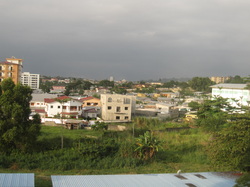 Two weeks ago (July 5-7), I was blessed to have been invited to join a group of amazing individuals who gathered in Libreville, Gabon to consider the legacy of Dr. Albert Schweitzer. Schweitzer arrived in Lambarene Gabon in 1913 and started his humanitarian work as a physician there. He returned to Europe from time to time but considered Lambarene and his hospital to be his home, and devoted his life to improving the health of the people there. 100 years later, a symposium was held to consider what health issues Schweitzer would be addressing if he were alive today. The symposium focused on the three major infectious diseases that constitute the public health crisis in Africa today - HIV/AIDS, Malaria and tuberculosis. Delegates from 22 countries gathered to meet, share knowledge, and consider mutual challenges. While it did not figure as largely on the formal agenda of the weekend, the subtext of the gathering was the underlying philosophy of Schweitzer's ethic of Reverence for Life and his humanistic approach to healthcare. Day 1, Saturday July 6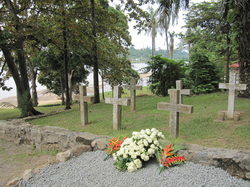 Early Saturday morning, my colleague Mark Churchill and I drove to Lambarene (3 hours from Libreville) on our own personal pilgrimage to see the Albert Schweitzer Hospital and pay our respects to the great man whose inspired vision has shaped our own life's work. This was an opportunity to reflect on Schweitzer's ethic of Reverence for Life, to gaze out at the Ogooue River that had inspired him, and re-dedicate ourselves to music, healing and service. Return to Libreville, evening at the Presidential Palace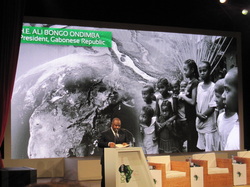 The weekend was sponsored by and hosted by the Gabonese government. H.E. President Ali Bongo Adimba greeted the guests on the first official event, an evening at the Presidential Palace. Talks included a panel of Nobel Laureates addressing Africa's major health Issues, and a brief overview of new modalities to fight the "Triple Epidemic: of HIV/AIDS, Malaria and tuberculosis. A dinner gala followed and the evening ended with a brief concert by the Royal Philharmonic Orchestra from London. Day 2 - Sunday July 7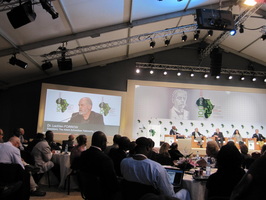 The second day was entitled "Applied Research Symposium on the Triple Epidemic: Providing Evidence Based and Practical Solutions," addressing such issues as epidemiology, prevention, screening and treatment. Some of the highlights were a discussion on coordinating care, both locally and internationally.and collaboration. The final panel, "Reimagining the governance model" featured Dr. Dr. Thomas Zeltner, Dr. Lachlan Forrow, Dr. Patrice Debre, and Ms. Trina Haque and was moderated by Declan Okpalaeke. They addressed the governance model of healthcare in Africa in the future, advocating improved resource allocation to achieve universal access to health. Here is a link to the panel discussion by these brilliant thought leaders. The Schweitzer familyAmong the many special aspects of the weekend was the participation of the surviving family members of Dr. Schweitzer's family. Like her grandfather, Dr. Christiane Engel is a physician and pianist, the daughter of the late Rhena Schweitzer Miller. Mr. Louis Schweitzer, is Albert Schweitzer's grand-nephew. Both spoke passionately about Dr. Albert Schweitzer's work and legacy and about their own determination to continue the family's legacy of healing and service.
5 Comments
Joy, sorrow, tears, lamentation, laughter – to all these music gives voice, but in such a way that we are transported from the world of unrest to a world of peace, and see reality in a new way. --Dr. Albert Schweitzer
I've just spent a refreshing and restoring weekend in the Berkshires. My talk on Thursday, July 19 at the First Congregational Church in Stockbridge drew 35 people, some of whom were medical professionals, others who were musicians or artists. My reflections on medical musicians and the role of music in healing alternated with movements from Bach's Goldberg Variations which were movingly and beautifully performed by Andy Jennings, Matt Dane and Norman Fischer. I shared stories and thoughts of Dr. Albert Schweitzer. Start early to instill in your students awareness that they are on this earth to help and serve others--that is as important to pass on to them as knowledge Following the presentation, I had the opportunity to meet colleagues from the Berkshires, including Dr. Deborah Buccino, a clarinetist/pediatrician who played with the Longwood Symphony during her pediatric training in Boston, and Dr. David Elpern, whose thought-provoking blog is invites the reader to consider the role of the arts and humanities in medicine. Thanks to Suburban Internal Medicine of Lee for sponsoring the event, First Congregational Church of Stockbridge for hosting, and my deep gratitude to David Anderegg and Kelley DeLorenzo for organizing the event. Last week, I gave readings of Scales to Scalpels at two bookstores, the first at New England Mobile Book Fair in Newton and the second at The Harvard Coop in Cambridge. 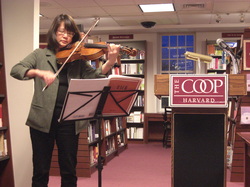 I opened each reading with the Allemande from Bach's G major Suite No. 1 - it was a way for all of us to breathe in harmony for a moment. Not only was this moment calming for those gathered in the audience, it was also calming for me. 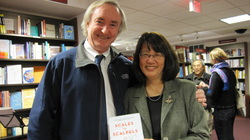 I was so touched that many friends came to the reading, including Boston Healthcare for the Homeless Program physician Dr. Jim O'Connell. Jim and I go back 20 years, when Longwood Symphony Orchestra played its first Healing Art of Music concert with the Albert Schweitzer Fellowship. 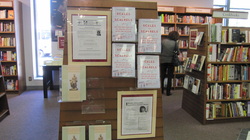 Next Thursday I'll be giving a lecture at the Countway Library at Harvard Medical School, and I was surprised and happy to see displays about my talk at the Harvard Medical Center Coop and at the Library itself. What's thrilling about all of this is - it isn't about me, but a new opportunity to further the dialogue about the importance of the |
Dr. Lisa M. Wong
I'm a musician and pediatrician, passionate about arts in education and about bringing the community together through music Archives
October 2015
Categories
All
|
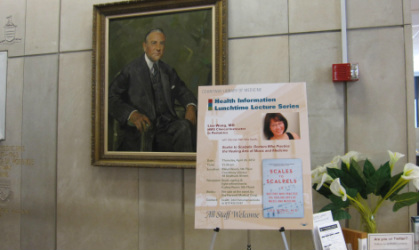
 RSS Feed
RSS Feed
